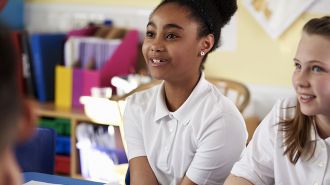- Our studies
- Our research
- Publications and resources
- Data access and training
- About
- News
- Events
- Get in touch
- Join our mailing list
Welcome to our news and blogs section. Here you’ll find the latest developments and insights from across our longitudinal studies.
Growing Up in Digital Europe (GUIDE) is the UK pilot of a major European initiative to create internationally harmonised data for research on child development and wellbeing.

People who begin smoking by the age of 16, and have experienced a challenging childhood, are more likely to find it harder to give up than those who started smoking later and had not experienced the same problems.

The trauma associated with care experience casts a long shadow on mothers’ mental health and that of their children, finds new UCL research released today (7 February 2024).
This webinar gives an overview of the data available on care and research opportunities in the four internationally-renowned cohort studies run by the Centre for Longitudinal Studies (CLS).
This short webinar gives first-time users and researchers less familiar with the Millennium Cohort Study (MCS) an insight into this unique longitudinal cohort dataset born at the turn of the century.
This short webinar gives first-time users and researchers less familiar with the Millennium Cohort Study an insight into this unique longitudinal cohort dataset born at the turn of the century. This session describes the study aims, content and design as well as offering a helpful look at some of the types of research that can […]
With many couples starting families later and a gradual shift in family size ideals, only child families are becoming or are expected to become more common, but many stereotypes remain around only children. Join us to learn more about whether only children are different or similar from children who grow up with siblings in terms […]

National Curriculum Key Stage 2 tests taken by 10- and 11-year-old children in England to assess progress in English and mathematics do not seem to affect children’s wellbeing, according to new research based on the Millennium Cohort Study (MCS).

Tens of thousands of secondary school pupils across England will be invited to take part this week in COSMO – the largest study of its kind into the effects of COVID-19 on a generation of young people.

Researchers from around the world have been using CLS study data to tackle important questions. Here is a round-up of nearly 100 new pieces of research that we’ve added to the CLS bibliography between April and June 2021.

This project aims to examine the experiences of care leavers who became parents (of cohort members) and the intergenerational impact on their children’s outcomes.

At age 17, 9% of males have carried or used a weapon, with one in four of those involved in this form of serious offending reporting they are gang members, according to UCL researchers.
Ryan Bradshaw
Senior Communications Officer
Phone: 020 7612 6516
Email: r.bradshaw@ucl.ac.uk